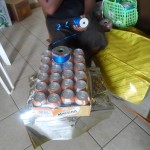Ni ayé àtijọ́, òbi ni o nfẹ iyàwó fún ọmọ ọkùnrin wọn. Bi òbi bá ri ọmọ obinrin ti o dára ni idile ti o dára, wọn á lọ fi ara hàn lati tọrọ rẹ fún ọmọ wọn ọkunrin. Àṣà yi ti yàtọ̀ ni ayé òde òni, nitori awọn ọmọ igbàlódé kò wo idile tabi gbà ki òbi fẹ́ iyàwó tabi ọkọ fún wọn. Ọkùnrin àti obinrin ti lè má bára wọn gbé – wọn ti lè bi ọmọ, tabi jẹ ọ̀rẹ́ fún igbà pipẹ́ tabi ki wọn ṣẹ̀ṣẹ̀ pàdé, wọn yio fi tó òbi leti bi wọn bá rò pé awọn ti ṣetán lati ṣe ìgbéyàwó.
Mọ̀ mí, nmọ̀ ẹ́, jẹ ikan ninu ìgbésẹ̀ àkọ́kọ́ ninu ètò igbeyawo ibilẹ̀. Yorùbá ni “Ẹni tó lọ si ilé àna, lọ sọ èdè oyinbo, ni yio túmọ̀ rẹ”, nitori eyi ẹbi ọkọ kò gbọ́dọ̀ ṣe ìgbéraga ni ilé àna bi ó ti wù ki wọn ni ọlá tó. Ẹbi ọkọ yio tọ ẹbi iyàwó lọ lati fi ara hàn ati lati ṣe àlàyé ohun ti wọn ba wa fún ẹbi obinrin.
- Ohun mimu ìgbàlódé ninu ẹru mọ̀ mi, nmọ̀ ẹ́ – Carton of modern drink among other packages for introduction. Courtesy: @theyorubablog
- Ẹ̀bùn didi fún mọ̀ mi, nmọ̀ ẹ́ – Wrapped gifts for Introduction. Courtesy: @theyorubablog
- Àkàrà òyinbó, èso, pẹ̀lú ẹrù tó kù – Carton of biscuit, fruit plus other items. Courtesy: @theyorubablog
Yorùbá ni “A ki lọ si ilé arúgbó ni ọ̀fẹ́”, nitori eyi, ẹbi ọkọ yio gbé ẹ̀bùn lọ fún ẹbi ìyàwó. Ọpọlọpọ igbà, apẹ̀rẹ̀ èso ni ẹbi ọkọ ma ngbé lọ fún ẹbi ìyàwó ṣugbọn láyé òde òni, wọn ti fi pãli èso olómi dipo apẹ̀rẹ̀ èso, ohun didùn, àkàrà òyinbó tabi ọti òyinbó dipò. Kò si ináwó rẹpẹtẹ ni ètò mọ̀ mí, nmọ̀ ẹ́, nitori ohun ti ẹbi ọkọ ba di dani ni ẹbi ìyàwó yio gba, ẹbi ìyàwó na yio ṣe àlejò nipa pi pèsè ounjẹ.
Mọ̀ mí, nmọ̀ ẹ́, o yẹ ki o fa ariwo, nitori ki ṣe gbogbo ẹbi lo nlọ fi ara hàn ẹbi àfẹ́-sọ́nà. A ṣe akiyesi pé awọn ti ó wá ni ilú nlá tabi awọn ọlọ́rọ̀ ti sọ di nkan nla. Èrò ki pọ bi ti ọjọ ìgbéyàwó ibilẹ. Ẹ ranti pé ki ṣe bi ẹbi bá ti náwó tó ni ó lè mú ìgbéyàwó yọri. Ẹ jẹ ki a gbiyànjú lati ṣe ohun gbogbo ni iwọntunwọnsin. Eyi ti o ṣe pataki jù ni lati gba ọkọ àti ìyàwó ni ìmọ̀ràn bi wọn ti lè gbé ìgbésí ayé rere.
ENGLISH TRANSLATION
In those days, parents often choose suitor for their son. When a parent identifies a beautiful lady from a good family, they show up in the lady’s family to seek her hand for their son. This culture has changed, because modern ladies and men no longer regard family value nor agree for parents to choose for them. Some partners often live together – some might have had children, nor must have been friends for long nor have just met, they just informed their parents if they are ready to tie the nut.
Yoruba adage also said “One must not go empty handed to visit an elder”, hence the groom’s family goes with gift for the bride’s family. Often times, they go with fruit baskets, but this has now been replaced with cartons of fruit juice, packets of sweet, carton of biscuit or wine (optional). Introduction is not very expensive because whatever the groom’s family can afford is what would be packaged and presented and whatever meal the bride’s family can afford is presented.
Introduction is one of the first step in the programme of Traditional Marriage. Yoruba said “He who goes to speak grammar in the in-law’s place will interpret it”, hence no matter how wealthy the groom’s family may be, they must not show arrogance in the bride’s family. The groom’s family goes to introduce themselves and to explain the reason for their visit.
Introduction is not supposed to be elaborate, because not all the extended family is expected at the fiancé’s family home. It is observed that those in big cities and the rich families has turned “Introduction” to a big deal. The crowd is often fewer than that of Traditional Marriage Day. Remember that it is not how expensive the ceremony that determines the success of a marriage. Let us endeavour to do all things in moderation. The most important thing is to advice the bride and groom on how to live a decent life.
Originally posted 2015-03-24 09:30:01. Republished by Blog Post Promoter





